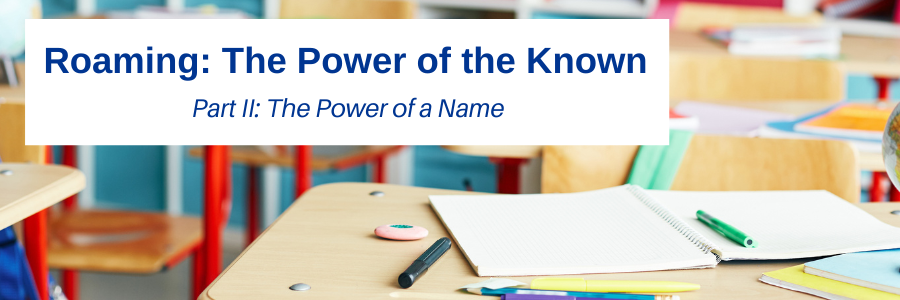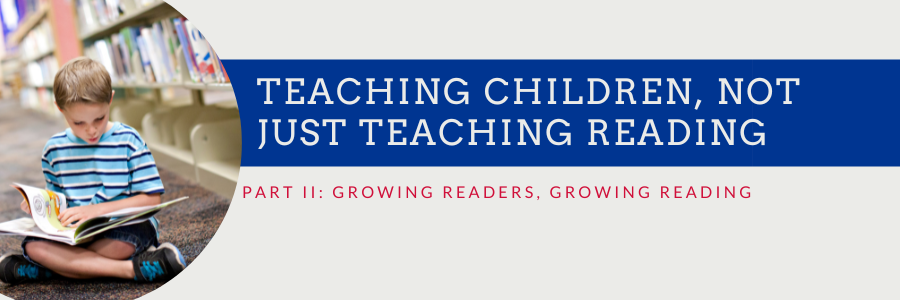BLOG
Teaching Children, Not Just Teaching Reading: How Do We Teach Readers and Reading?
Dr. Jennifer Scoggin and Hannah Schneewind
Join us on Thursday for Part II of Teaching Children, not just Teaching Reading: Growing Readers, Growing Reading
“The teaching should not start where the teacher is but where the child is.”
Marie Clay
Marie Clay’s (2005) words urge us to start from a place of strength when preparing to teach students.
We often begin this work by thinking about the teaching of reading. Where is a child in their knowledge and use of the skills and strategies required to unlock all that a particular text has to offer? What do they do to help themselves when they are problem-solving? What strengths can we observe? Listening and kidwatching as students engage with text are powerful drivers of instructional decision-making.
At the same time, how can we expand the idea of starting where a child is to also include what we know about the teaching of readers? Research (and probably countless classroom observations) teaches us that skills and strategies instruction alone does not lead to maximal reading growth. To foster the transfer of those skills to independence, students need multiple opportunities to read books that they picked and their own purposes for reading. Students’ engagement and motivation enhance their participation, attention, and effort (Afflerbach, 2022) while also creating space for students to meaningfully apply and own their learning.
So what can it mean to start where a child is as a reader? How can we roam around and learn what a child knows about themselves as a reader?
Consider incorporating the following practices:
- In small groups, facilitate an inquiry into students’ reading identities. A student’s reading identity includes five aspects: self-efficacy, attitude, habits, book choice, and process (Scoggin and Schneewind, 2022). Start with a gentle prompt, such as “Tell me about yourselves as a reader.” Then move to ask further questions that invite students to share about each aspect of their identity as readers.
- Confer with students one-on-one as they are reading. Probe into their reading process by asking, “What do you think about when you read? What do you do when you get to a word you don’t know?”
- Kidwatch during independent reading. Take note of: What books do students choose? Do they prefer to read alone or with a partner? What are the visible signs of engagement?
In honoring the information we glean from these practices, we broaden our understanding of student strength by including what we know about the teaching of reading and readers. When we combine our expertise in the teaching of reading with our understanding of a student’s reading identity, we can create strengths-based instructional pathways that lead to lasting reading growth both in and out of the classroom.
Register today for LitCon 2023 to hear Jennifer and Hannah in their presentation Trusting Feedback: Promoting Growth, Agency and Identity on Monday, January 30. Hannah Schneewind and Jennifer Scoggin are the co-creator of Trusting Readers, a group dedicated to collaborating with teachers to design literacy opportunities that invite all students to be engaged and to thrive as readers and writers. Together, they published Trusting Readers: Powerful Practices for Independent Reading with Heinemann in the spring of 2021.
Dr. Jennifer Scoggin has been a teacher, author, speaker, curriculum writer, and literacy consultant. Jen is an advocate for both teachers and students and is most happy when she is working alongside children in classrooms. Jen is also the mother of two book lovers; nothing makes her more proud than that. Jen began her career teaching first and second grades in Harlem, New York. In her current role as a literacy consultant, Jennifer collaborates with teachers to create engaging literacy opportunities for children. She holds a doctorate in curriculum and instruction from Teachers College, Columbia University and has previously published two books about literacy instruction and life in the classroom.
Hannah Schneewind has been a teacher, staff developer, curriculum writer, keynote speaker, and national literacy consultant. She brings with her over 25 years of experience to the education world. Hannah’s interest in student and teacher agency and her belief in the power of books informs her work with schools.
THE JOURNAL OF READING RECOVERY
Spring 2024
Constructing a More Complex Neural Network for Working on Written Language That Learns to Extend Itself by Carol A. Lyons
Reading Recovery IS the Science(s) of Reading and the Art of Teaching by Debra Semm Rich
Predictions of Progress: Charting, Adjusting, and Shaping Individual Lessons by Janice Van Dyke and Melissa Wilde
Teachers Designing for Context: Using Integrity Principles to Design Early Literacy Support in Aotearoa New Zealand by Rebecca Jesson, Judy Aitken, and Yu Liu







